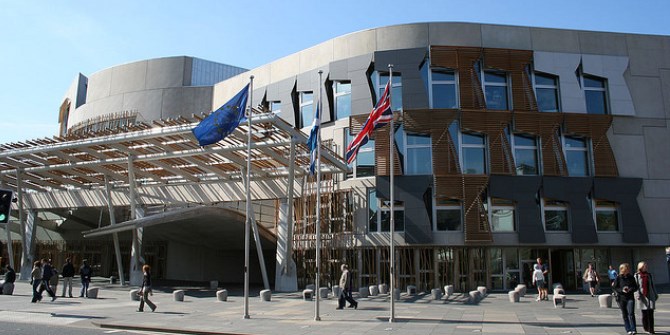 Scotland has been largely self-governing in major areas such as health, education and local government since devolution in 1999. All types of policy innovation were promised with devolution and are promised by advocates of independence. In this context it is salutary to reflect that the overall record of the Scottish Government and the Scottish Parliament in these major policy areas in the decade and a half of their current existence is, with a few exceptions, conservative, argues Norman Bonney.
Scotland has been largely self-governing in major areas such as health, education and local government since devolution in 1999. All types of policy innovation were promised with devolution and are promised by advocates of independence. In this context it is salutary to reflect that the overall record of the Scottish Government and the Scottish Parliament in these major policy areas in the decade and a half of their current existence is, with a few exceptions, conservative, argues Norman Bonney.
Perhaps the most remarkable feature of policymaking in Scotland under devolution has been its profound conservatism. The establishment of the Scottish Government and the Scottish Parliament in 1999 were supposed to lead to a form of more transparent and accountable governance that would free Scotland from the dead hand of decision making at UK level and make government more responsive to Scottish concerns. But the reality of policy outcomes has been much more modest than the rhetoric of political leaders.
Local Government
In the major fields of domestic policy responsibility assigned to the new devolved institutions, such as health, education, local government, there have been remarkably few initiatives. A system of local government, reorganised in 1996 on the basis of 32 multi-purpose local authorities and designed by the preceding Conservative UK government, has been largely left untouched. As in England a grossly inadequate system of council tax inherited from the preceding Conservative government and crying out for reform, has been left untouched by the first two Labour/Liberal Democratic administrations and the two successor SNP administrations. And under the latter the system has been shored up by Scottish government funding to facilitate a council tax freeze and containment of local government expenditure.
Education
In primary and secondary education the basis structure of service delivery has continued from the inherited system. The Curriculum for Excellence has, however, seen a comprehensive review of the content of teaching and learning. Even despite Scottish Government concerns about sectarianism in Scottish society and legal and policy initiatives on the matter, the division of state schooling into those 14 per cent of schools with a Roman Catholic ethos and the ‘non-denominational’ but Protestant remainder has been continued in accordance with Scottish laws inherited from the Westminster UK Parliament in 1999. Laws similarly inherited concerning required religious observance (prayers) in state schools have never been debated in the Scottish Parliament although administrative guidelines for them have been twice amended by the Scottish Government in ways that has avoided debate in the Parliament and confined discussion to certain interested religious groups.
At the tertiary level, the continued generous funding of the Scottish Government by the UK Government has to be one major factor explaining how free university tuition continues to be available to Scottish and EU students but not those originating south of the border. Savings on budgets for further education student maintenance and other economies in that sector have also contributed to the priority accorded higher education. UK wide funding arrangements for research have disproportionately benefited Scottish universities such that the Scottish Government would like to continue them even if Scotland votes to be a separate country.

Health
Health expenditure of about £11 billion constitutes about one third of all the Scottish budget and results in a ten per cent per capita higher spend north of the border compared to England. But although the Scottish NHS has been spared the scale of continual market based reorganisation experienced in the south and limited moves to hospital trusts were repealed, relative performance does not seem to have improved. For instance, the percentage of the Scottish population saying that their health was ‘not good’ in both the 2001 and 2011 censuses remained the same at 10 per cent. The percentage of the population with a long term activity-limiting health problem or disability was 20 per cent in both years. In England the comparable latter figure was 18 per cent in both years. Despite the higher per capita spending on health in Scotland there is no evidence that devolution in health policy has made any profound difference in comparative levels of well-being or substantially eroded differences in health outcomes between Scotland and England. A study for 2001-7 suggested, for instance, that Scotland still had one of the worst health records in Europe and that ‘excess mortality’, above that accounted for by deprivation, was 20 per cent higher in Scotland than England.
A 2012 Audit Scotland report has also indicated little change in health inequalities within Scotland in the last decade. Despite avoiding the major structural reorganisations experienced by the NHS in England, and being more generously endowed with public funds, the NHS in Scotland does not seem to have made, under devolution, any fundamental change to the pattern of relatively poor health outcomes. Devolution did not involve much change in the governance of health in Scotland in as much as the ministerial, civil service and medical leadership continued as before but within a new ministerial structure. What was new was the Scottish Parliament and it does not seem to have made much difference.
Policy innovations
Two innovations do, however, deserve mention. Free prescriptions were brought in by the minority SNP administration just prior to the 2011 Scottish Parliamentary elections at an additional annual cost of only £57 million since the elderly and groups like cancer patients already benefited from such arrangements. Free personal care, initiated by the second Labour/Liberal Democrat administration, was a much more costly innovation. In 2011 70,000 people benefited from this service. According to one study this system results in spending on social services in Scotland being 25 per cent higher per capita than elsewhere in UK. Mention also needs to be made of the recent merging of regional police and fire services into centralised national organisations – perhaps the most radical of the changes resulting from devolution.
Devolution – a shield and a clamp?
One of the major purposes of devolution was to provide a shield for Scotland from Westminster UK policies on domestic issues which were unfavourably regarded north of the border. This purpose has been achieved in matters such as the organisation of the health services and it has been accompanied by innovation in some policy areas. But what is most remarkable is the lack of institutional and policy change in the major spending areas of local government, education and health where systems inherited from the UK system of government have been continued without any substantial critical scrutiny in the new national legislature and little evidence of improved overall performance. The rhetoric of devolution has been much more radical than the reality.
Note: This article gives the views of the authors, and not the position of the British Politics and Policy blog, nor of the London School of Economics. Please read our comments policy before posting. Image credit: ajnabee
 Norman Bonney – Edinburgh Napier University
Norman Bonney – Edinburgh Napier University
Norman Bonney is emeritus professor at Edinburgh Napier University. His recent publications are listed at http://www.normanbonneypublications.blogspot.co.uk. He tweets from @NormanBonney








Really uninformed post that ignores the success of free long-term care in Scotland and worst of all: ignores that the counterfactual to devolution ( Westminster centralisation) exhibits increasing individual and regional health inequalities,…
Scotland’s NHS has been ‘devolved’ since 1948, and it’s unique education system since the first schools.
If Professor Bonney can’t get that right …..
He also throws out a few ‘facts’ relating to public spending, and it looks like he’s invoking what Professor Morag Gillespie calls ‘the tyranny of averages’ – where the averages of 9 very different English Regions (as defined by he Treasury’s PESA tables) plus Wales and NI are compared to Scotland.
This hides the reality of public spending throughout the UK, and hides the fact that 8.3 million Londoners receive the second highest per capita spend for those services in the UK – and that it’s NI that is top of that table – NOT Scotland.
On a per capita basis, we know that Londoners receive one to several thousand pounds more than people in NE, NW, SW and a couple of other English regions.
We also know that massive capital projects in London (Professor Tranters ‘Dark Star’ and Vince Cable’s ‘massive suction pump’) reduces the need for public services in London.
Only three ‘parts’ (the 9 regions plus Wales, NI, and Scotland) are net contributors to the Treasury – London, SE England, and Scotland. None of that trio is ‘subsidised’ by Westminster, and it would be nice to see that fact reported in the London-based media now and again.
Instead (with the exception of the FT/Times) we see claims that Scotland is ‘subsidised’ by ‘the UK or ‘England’.- a myth created by the Daily Mail in 2010 when it took that ‘UK average’ and compared it to the Scottish PESA figure.
What the Mail didn’t say was that at that time the per capita Public Services spend in London was £10,655, while Scotland’s was £10,400 (NI was over £11,000), and the latter’s GDP was – as usual – 118% of the UK average.
This is a generally fair conclusion to draw from a limited analysis of post-devolution Scottish policy-making. Although Prof. Bonney notes that his analysis is focussed on health, education and local government, his argument is weakened by neglect of Scotland’s more radical Acts on Land Reform (2003) or Climate Change (2009). Although progress in both fields is slow, and still at an early stage, the existence of these pieces of legislation suggests Holyrood administrations have not been entirely conservative. In allowing crofting communities the absolute right to buy their land, the Land Reform Act challenges norms and rights of individual property ownership enshrined at the heart of modern liberal democracy. Equally, the Climate Change Act, when passed in 2009, was hailed as the strongest climate legislation in the industrialised world. These are not the Acts of conservative administrations. However, there is ample scope for the current SNP government to demonstrate radicality through continued progress in both fields. The Land Reform Review Group’s recent report ‘The Land of Scotland and the Common Good’ outlines 62 recommendations to continue progress on land ownership issues in Scotland. Meanwhile, the country has not yet achieved emissions reductions in line with targets set by the Climate Change Act. It will be interesting to observe the administration’s response to the opportunities posed.